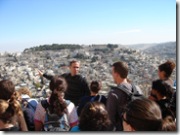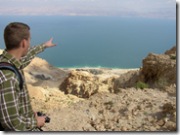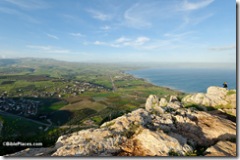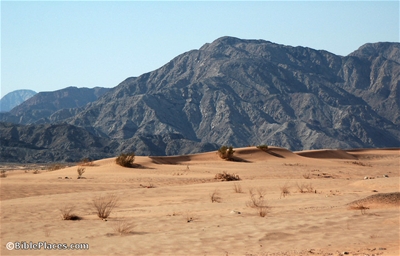I’ll be traveling aggressively throughout Israel the next four weeks. Time and internet access will be limited, so posting will be less frequent. If you’re interested in following a (different) group along on their Holy Land tour, Insight for Living has started a video blog for their trip. From their first post, it looks they will update it daily and do it with plenty of whiz-bang.
The best archaeological guide to Israel is now out in its fifth edition. The Holy Land: An Oxford Archaeological Guide, by Jerome Murphy-O’Connor is the best companion for a trip to ancient sites  anywhere in Israel. The section on Jerusalem is especially lengthy (150 pages in the 4th edition), and the whole is accurate and readable. Don’t expect to find out about hotels or restaurants – this is a guide to archaeological sites only! The 4th edition came out in 1998, so while I haven’t yet seen the new edition, I expect it will have significant updates. The author has lived in Jerusalem longer than I have been alive.
anywhere in Israel. The section on Jerusalem is especially lengthy (150 pages in the 4th edition), and the whole is accurate and readable. Don’t expect to find out about hotels or restaurants – this is a guide to archaeological sites only! The 4th edition came out in 1998, so while I haven’t yet seen the new edition, I expect it will have significant updates. The author has lived in Jerusalem longer than I have been alive.
If you’re a college professor or other tour group leader, you might be interested in this familiarization tour to Turkey in March. This came via Mark Wilson, who has led two college/seminary groups this year that I recommended. Both were delighted with their trips. It’s not clear to me if he is apart of this trip or not, but here are the details they sent:
Dear Professors, Colleagues, and Group Leaders, We are currently taking sign ups for the MARCH 7-15, 2008 FAM. TRIP! The March familiarization trip is for professors who are bringing or would like to bring a group to Turkey and want to come beforehand to do the tour. This is very limited space because of the special price. The professor price of $1,095 is land, airfare & tax inclusive, based on double occupancy, with airfare from New York, JFK. The cost of a single room is $1,390 per person. Please ask for our spouse rate. Participants of this trip are responsible for their own transport to and from JFK. If you are interested in signing up for this trip please contact me for further details. We are also exciting for Tutku Tours’ Newest programs; January Trips, Study Abroad Programs and of course our Ephesus Meeting May 2008, www.ephesusmeeting.com in which we will have many wonderful groups and fascinating speakers. We customize all of our groups’ itineraries to fit their needs. Please ask for any brochures or further details. We hope to meet you AT OUR BOOTH in San Diego, November 14-16, at ETS (booth #216), and November 17-20, at AAR & SBL, (booth #737). We will also be offering additional meetings slide show presentations, The Seven Churches, and the Footsteps of St. Paul in Asia Minor. ETS additional meeting, date and time will be announced and the SBL additional meeting is Sunday, November 18 from 4:00- 6:30 pm. We look forward to discussing your future plans for travel in Turkey, as well as our other destinations Greece, Israel, Egypt, Ukraine, and Northern Cypress. Attached, you will find the inaugural issue of the latest news of Biblical Turkey, in the ‘Asia Minor Report’ newsletter, put together by Dr. Mark Wilson. We hope it is of interest to all of the scholars that we work with! We have great references from other college and university groups, which we would be happy to share with you! Please let me know if I can help answer any questions you may have. We look forward to seeing you and your groups here in 2008!
Best Regards,
Erin Dailey
Director of Operations
Ephesus Meeting
www.ephesusmeeting.com Tutku Tours
www.tutkutours.com
After a trip to Israel, Turkey is the place to go. You need more than a week, but this is just the familiarization trip to get you to come back for a longer time with a lot of people.
I taught my first college-level tours in Israel when I was 21, and for the past 14 years, I have led many student groups of various shapes and sizes. Here are some suggestions that I believe make for a better tour of Israel, with varying applicability depending upon the group.
1. Do the more mentally challenging sites in the morning. Students are more ready to learn when they are less tired. For instance, if you’re visiting the sites north of the Sea of Galilee, I think it’s better to go to Hazor and Dan in the morning and drive across the Golan Heights in the afternoon.
2.  Whenever possible, keep subject-related sites together. For instance, in the Galilee area, I find it best to group the sites related to the life of Christ together on a single day. This is preferable to bouncing back and forth between various periods. This is not always possible, as, for instance, it isn’t practical to visit En Gedi (more OT-related) and Masada (more NT-related) on different days.
Whenever possible, keep subject-related sites together. For instance, in the Galilee area, I find it best to group the sites related to the life of Christ together on a single day. This is preferable to bouncing back and forth between various periods. This is not always possible, as, for instance, it isn’t practical to visit En Gedi (more OT-related) and Masada (more NT-related) on different days.
3. Always prepare the group. Surprises are usually bad. Warn them the day before if the next day is going to be especially physical, or particularly late, or generally boring. Almost more important than reality are the expectations. I can almost make a lame site good just by thoroughly disparaging it in advance!
4. Don’t talk too much. If you do, they won’t hear what is important. The goal is not to show off how much you know but to help them understand.
5. Sometimes less is more. It might be better for the group to skip a site than to squeeze it in. It may be better for you to skip an explanation than to give it.
6. Skip more impressive (non-biblical) remains in favor of a less impressive site with a biblical story. I’ll skip Beth Shearim, but never Tel Jezreel. I’ll skip Sepphoris, but not Nazareth. I’ll skip Avdat, but not Arad.
7. Read the Bible where it happened. Don’t skip this for your explanation. You can’t always read every biblical story on site, but it is better to err on the side of too many than not enough.

8. Don’t be afraid to confess ignorance. If you pretend you know and are then shown to be in error, you lose credibility. If you don’t have credibility, you’re just a chauffeur.
9. Lunch breaks are for eating. When you’re done eating, get moving.
10. Do what the group does, even if you’ve done it a hundred times and hate it. If you skip walking through Hezekiah’s tunnel, or you skip watching the Qumran video, it communicates that this is your job and not your passion.
11. Try hard. They’ll see it and they’ll follow your example.
12. Leave on time. If everyone is not there, leave anyway. If you don’t, they learn that deadlines don’t matter and within a week, you’ll consistently be 15 minutes (or more) late leaving everywhere. And then you miss cool things or won’t be able to do #7.
13. Wait for the group. When you’re at a site, wait until everyone catches up before beginning the explanation. This communicates that what you say is important, and it reduces the number of questions about the things you already said.
14. Give them time to take pictures after the explanation. If you don’t, they’ll take pictures when you’re teaching and they won’t be listening.
15. Love what you do. For me this means not giving tour after tour after tour. If I do, I am not excited anymore. Many tour guides are boring because they are bored. And no wonder, when they do the same tired itinerary week after week.
16. Different guides have different priorities that define the day. Here are some of mine:
- The first view of the Sea of Galilee is from Arbel, always in the afternoon. This creates a lasting memory.

- Take a boat ride on the Sea of Galilee in the afternoon. This is a good change of pace, and afternoons need changes of pace more than mornings. In the summer, it’s a refreshing break from the heat.
- Visit Mount Carmel (Muhraqa) in the afternoon. It is one of the top three views in the country and there is often poor visibility in the morning.
- I never skip the Cove of the Sower, even though it’s become more difficult over the years. There’s less traffic early in the morning.
- I like to visit Cave 1 at Qumran, especially since very few people know where it is.
- Tagged Travels
A good follow-up to the Beyond Cyprus post is yesterday’s article in the Star-Telegram about a reporter’s visit to Jordan. The article is well-written and interesting, but the author doesn’t mention some of my favorite sites in Jordan, including:
- Macherus – where John the Baptist was beheaded
- Penuel and Mahanaim – where Jacob wrestled with the angel
- Medeba – location of the oldest map of the Holy Land (from 580 A.D.)
- Amman acropolis – where Uriah was killed following David’s adultery
- Kerak – capital of the Moabites (ancient Kir/Kir-hereseth)
Too few students of the Bible go to Jordan, and those that do, usually miss the best places. The University of the Holy Land periodically does a two-week trip in Jordan; it is led by Dr. Ginger Caessens and is excellent. Their website indicates the next one planned is June 2008.
One other thought from the Star-Telegram article: Bethany beyond the Jordan is quickly becoming over-commercialized. And it is very likely not the place mentioned in the Bible.
- Tagged Travels
If I could do only one trip to the Middle East to learn about the Bible, I would go to Israel. Second, Turkey and Greece, though for most only western Turkey would be included in the itinerary (and I profited more from eastern Turkey than western). Jordan and Egypt would be next. Near the bottom of the list would be the islands of Cyprus, Crete, Malta, Rhodes, and the city of Rome. If someone can do it all, then they’ll gain from it, but most have to choose one or two trips, and for that, I recommend they skip some things. But this recommendation probably isn’t necessary because there aren’t many trips going to these places as part of a biblical tour anyway. I can’t speak to Lebanon, Syria, Iraq and Iran because I haven’t been. Yet. I do think a second trip to Israel is worthwhile, moreso than a first trip to some of the biblical countries.
I would not recommend someone to try to do Israel and Turkey/Greece on the same trip. This is because there is just so much to digest and you don’t have the time necessary to do that if the two are put together on an initial trip. Israel largely introduces one to the Old Testament world; Turkey and Greece are a new window into the NT arena. I do believe understanding these “worlds” is very valuable for understanding the Scriptures, even apart from seeing the biblical sites themselves. You just understand Paul better when you see the gods they were worshipping in his day, see the temples that dominated the cities, and see the way of life of the Greek people.
- Tagged Travels
Search
About the BiblePlaces Blog
The BiblePlaces Blog provides updates and analysis of the latest in biblical archaeology, history, and geography. Unless otherwise noted, the posts are written by Todd Bolen, PhD, Professor of Biblical Studies at The Master’s University.
Subscribe
Tags
10th Century
American Colony Photos
Analysis
Antiquities Trade
Dead Sea
Dead Sea Scrolls
Discoveries
Egypt
Excavations
Forgery
Galilee
Greece
Holidays
Israel's Coast
Italy
Jerusalem
Jezreel Valley
Jordan
Jordan Rift
Judah
Lebanon
Lectures
Mediterranean Islands
Mesopotamia
Museums
Negev
New Exhibits
Persia
Philistines
Photo Resources
Picture of the Week
Pseudo-Archaeology
Resources
Sad News
Samaria
Shephelah
Syria
Technology
Temple Mount
Tomb of Jesus
Tourism
Travels
Turkey
Weather
Weekend Roundup
Links
Notice
As an Amazon Associate we earn from qualifying purchases. In any case, we will provide honest advice.
